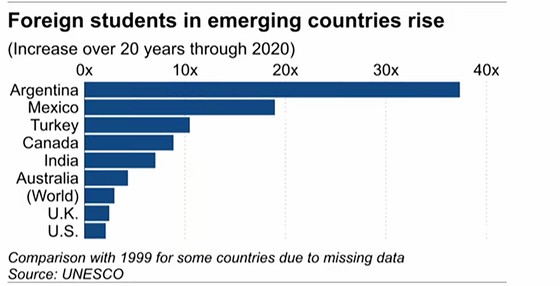SGGP
Emerging economies in the Southern Hemisphere and developing economies such as Argentina, Turkey, India… have witnessed a sharp increase in the number of foreign students flocking to study at universities.
Initially, Rina Lika, a 20-year-old Albanian student, planned to study abroad in other European countries, but eventually decided to study International Relations at Ankara University in Turkey. According to Rina Lika, many Turkish universities have good reputations and the Turkish government offers more generous scholarships, covering not only tuition and dormitory fees but also living expenses. Universities in Turkey enrolled a total of 180,000 international students in 2020, a tenfold increase from 20 years ago.
 |
Foreign students studying in Türkiye |
Besides Turkey, many other rapidly growing economies in the G20 are popular with international students. According to UNESCO, in the 20 years to 2020, the number of foreign students increased by about 37 times in Argentina, 19 times in Mexico and 7 times in India, while the number increased by an average of only 3 times worldwide .
 |
Over the past 20 years, developing countries have attracted more students than the US, UK, Australia… |
The US remains the number one host of international students, with 950,000 in 2021, followed by the UK and other developed countries. But the share of middle-income countries has increased by 6 percentage points over the past 20 years. International students from middle-income countries account for about 60% of all international students globally. However, rather than seeking education in developed countries, students from developing countries prefer universities in nearby education hubs, which allow them to take advantage of lower tuition fees and increased employment opportunities.
Argentina welcomed 120,000 international students in 2020, up 60% from 2016. Meanwhile, the number of international students increased by an average of only 20% worldwide during the same period. According to the “Best Student Cities 2023” ranking by the British consultancy Quacquarelli Symonds, Buenos Aires, Argentina, ranked 23rd, while most of the top-ranked cities are in developed countries. The capital of Argentina is considered a “dynamic city with many opportunities for international students” with relatively low living costs and tuition fees…
Hiroshi Sato, a professor at the University of Tsukuba, northeast of Tokyo, and an expert on international education, also noted changes in young people’s attitudes toward studying abroad. Born into the age of globalization, many young people are more open to studying in emerging countries. Easy access to information through social media has also made schools in these countries more accessible.
According to Nikkei Asia, the number of students coming to the Southern Hemisphere is expected to increase when the Covid-19 pandemic is over. To proactively welcome this change, some emerging countries have made it a national policy to attract foreign students. Türkiye has seen the number of foreign applicants quadruple to 160,000 students over the past decade. Turkish President Recep Tayyip Erdogan once declared: “We will increase the number of foreign students to 1 million to make Türkiye one of the world's top five study abroad destinations.”
Source

































































































Comment (0)